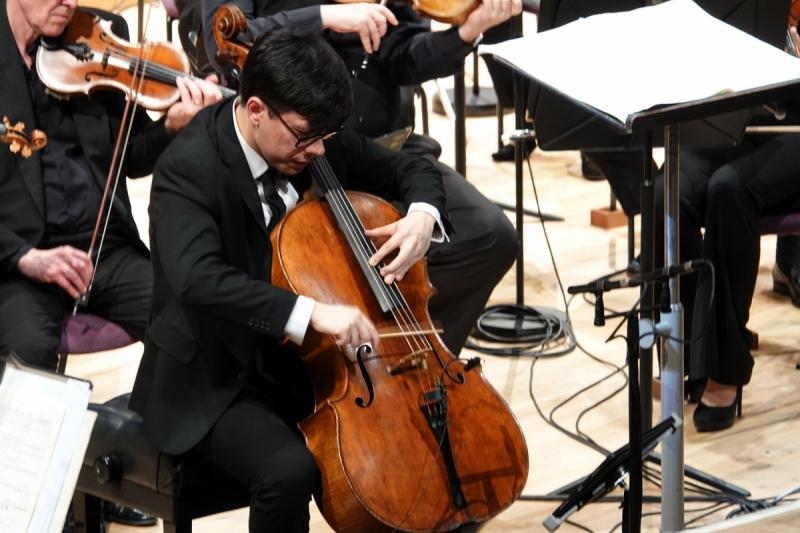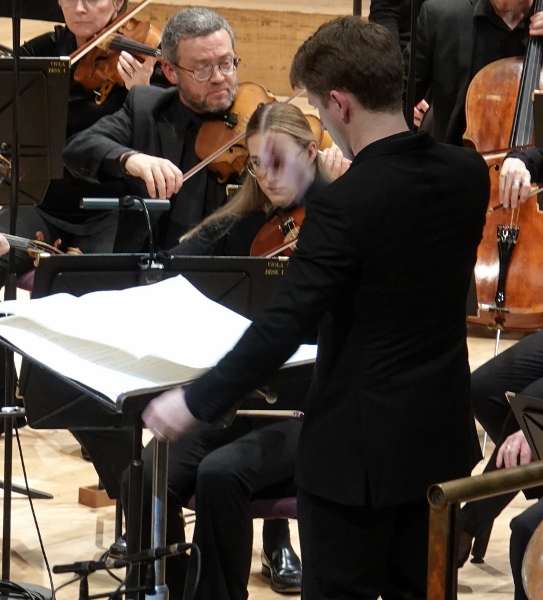Fung, BBC Philharmonic, Weilerstein, Bridgewater Hall, Manchester review - clever and comical | reviews, news & interviews
Fung, BBC Philharmonic, Weilerstein, Bridgewater Hall, Manchester review - clever and comical
Fung, BBC Philharmonic, Weilerstein, Bridgewater Hall, Manchester review - clever and comical
First UK performance of new cello concerto by Katherine Balch given with uncanny skill

Placing the UK premiere of Katherine Balch’s whisper concerto (for cello and orchestra) after Haydn’s Symphony No. 100 was probably an inspired idea from the BBC Philharmonic and conductor Joshua Weilerstein.
In its day, the so-called “Military” Symphony was not only striking on account of its use of novel instrumental effects – the “Turkish music” sound of triangle, cymbals and big drum for one, and clarinets (heard, military-band style, alongside oboes and flute) for another – but the clever and comical way they were brought into a context that was otherwise seemingly orthodox and almost academically conventional.
 Weilerstein played it in a manner that we don’t often get with Haydn symphonies now: far from paring string forces down to the dimensions most frequently on offer in the composer’s own day, he had 40 string players around him and also the plummy sound of modern timpani, albeit hit with hard sticks. The second violins were concealed behind their first violin colleagues and only rarely audible when their line had imitative figures in it, indeed the entire texture was top-dominated and solid.
Weilerstein played it in a manner that we don’t often get with Haydn symphonies now: far from paring string forces down to the dimensions most frequently on offer in the composer’s own day, he had 40 string players around him and also the plummy sound of modern timpani, albeit hit with hard sticks. The second violins were concealed behind their first violin colleagues and only rarely audible when their line had imitative figures in it, indeed the entire texture was top-dominated and solid.
Those “Turks” made their presence heard in loudly assertive style when they gatecrashed the decorous r
efinement of the second movement’s allegretto, but after the careful dance steps of the minuet (soldierly types doing their best to remember their ballroom lessons, perhaps?) in the conclusion of the final movement they had grown more civilised and able to join in the jolly extroversions of its presto.
The solo of Katherine Balch’s concerto was played by Zlatomir Fung, the American cellist of Bulgarian and Chinese heritage who premiered it last year in Texas (it was co-commissioned by the BBCX with the Dallas Symphony and Staatstheater Darmstadt and had its European premiere in Darmstadt last year, too).
It looks conventional at first: three movements, each with its title in Italian. But then you notice that the Andante is agitato, the Presto is dolcissimo, and the finale Andante di nuovo – well, that has its own surprises, too.
As Balch herself comments in her note, “how can an andante be agitato? A presto dolcissimo?” She’s going to show us how. Convention might dictate that the composer of a cello concerto is going to agonise over how to make the soloist heard against the texture of a modern orchestra (and she specifies 50 strings minimum). In this case there were five percussionists, making a dazzling variety of noises, as well as the weight of full brass and wind and a prepared piano … so how to do it? Amplification, stupid. Zlatomir Fung had his own private sound system, with a couple of small speakers in front of him, and I’m told there was “some manipulation of sound” also. And since he had to play for a considerable length of time with a chopstick in place of his bow, it clearly helps to be able to make unusual sounds audible.
Balch is very precise in her requirements, not only of the soloist but of the orchestra, asking for variations on playing methods such as pizzicato and flutter-tonguing, and I could see Ian Buckle the piano player almost disappearing inside his instrument in order to fulfil her bidding.
For the soloist there are extreme demands of virtuosity, which Fung, I’m sure, met with uncanny skill, and when playing in the normal way his tone was serene and beautiful (the orchestra’s assistant principal cello, Maria Zachariadou, eloquently had her moment, too, as she took over the solo’s melodic role in the third movement while he was busily occupied with other things).
So what does it all amount to? The piece is a tribute to Ligeti’s Cello Concerto and its “whispering cadenza”, and she says she aims to make the sounds “extremely strange”, while using “almost conventionally tonal” melodies, fragments of free jazz and a kind of chorale effect (which becomes heavily obvious towards the end of the piece) as well. There’s also intentional “disorder” and “shameless noise” – those were clear enough, with a really weird sequence of pops and rattles from the percussionists while the soloist was doing his thing with the chopstick. But to the listener the underlying language is one of tonality and concord. It’s harmony, Jim, but not as we know it, and that is both seriously amusing and unnervingly reassuring.
Manipulating sound and confounding expectations are the essence of compositional skill, and for the second part of the concert we had a masterclass in the way to do it, in Mozart’s Symphony no. 41 (the so-called “Jupiter”) – the orchestral strings back to the dimensions heard in the Haydn earlier. Joshua Weilerstein (pictured above right) decided to make it into a bit of a lecture-demonstration, too, and played us first the finale of Michael Haydn’s Symphony no. 28, a piece which Mozart apparently took ideas from as to how fugal technique could be used inside the structure of a classical symphony, while doing it so many times better with the last movement of the “Jupiter”. Mediocrity imitates, while genius steals, as they say.
The opening was vigorously and neatly articulated, with Yuri Torchinsky back in the leader’s chair (and the violins behind him playing delightfully in the Andante cantabile, too). The minuet was smooth and delicate, and the finale gloriously clear, with brassy horns and energy on all sides.
Sadly, the prospect of music by an unknown name was enough to deter Manchester’s Saturday night concert-goers in droves, despite the mainstream symphonies to sugar the pill.
- Recorded for broadcast on Radio 3 on 21 February and subsequently on BBC Sounds
- More classical and opera reviews on theartsdesk
rating
Share this article
The future of Arts Journalism
You can stop theartsdesk.com closing!
We urgently need financing to survive. Our fundraising drive has thus far raised £49,000 but we need to reach £100,000 or we will be forced to close. Please contribute here: https://gofund.me/c3f6033d
And if you can forward this information to anyone who might assist, we’d be grateful.

Subscribe to theartsdesk.com
Thank you for continuing to read our work on theartsdesk.com. For unlimited access to every article in its entirety, including our archive of more than 15,000 pieces, we're asking for £5 per month or £40 per year. We feel it's a very good deal, and hope you do too.
To take a subscription now simply click here.
And if you're looking for that extra gift for a friend or family member, why not treat them to a theartsdesk.com gift subscription?
more Classical music
 Appl, Levickis, Wigmore Hall review - fun to the fore in cabaret and show songs
A relaxed evening of light-hearted fare, with the accordion offering unusual colours
Appl, Levickis, Wigmore Hall review - fun to the fore in cabaret and show songs
A relaxed evening of light-hearted fare, with the accordion offering unusual colours
 Lammermuir Festival 2025, Part 2 review - from the soaringly sublime to the zoologically ridiculous
Bigger than ever, and the quality remains astonishingly high
Lammermuir Festival 2025, Part 2 review - from the soaringly sublime to the zoologically ridiculous
Bigger than ever, and the quality remains astonishingly high
 BBC Proms: Ehnes, Sinfonia of London, Wilson review - aspects of love
Sensuous Ravel, and bittersweet Bernstein, on an amorous evening
BBC Proms: Ehnes, Sinfonia of London, Wilson review - aspects of love
Sensuous Ravel, and bittersweet Bernstein, on an amorous evening
 Presteigne Festival 2025 review - new music is centre stage in the Welsh Marches
Music by 30 living composers, with Eleanor Alberga topping the bill
Presteigne Festival 2025 review - new music is centre stage in the Welsh Marches
Music by 30 living composers, with Eleanor Alberga topping the bill
 Lammermuir Festival 2025 review - music with soul from the heart of East Lothian
Baroque splendour, and chamber-ensemble drama, amid history-haunted lands
Lammermuir Festival 2025 review - music with soul from the heart of East Lothian
Baroque splendour, and chamber-ensemble drama, amid history-haunted lands
 BBC Proms: Steinbacher, RPO, Petrenko / Sternath, BBCSO, Oramo review - double-bill mixed bag
Young pianist shines in Grieg but Bliss’s portentous cantata disappoints
BBC Proms: Steinbacher, RPO, Petrenko / Sternath, BBCSO, Oramo review - double-bill mixed bag
Young pianist shines in Grieg but Bliss’s portentous cantata disappoints
 theartsdesk at the Lahti Sibelius Festival - early epics by the Finnish master in context
Finnish heroes meet their Austro-German counterparts in breathtaking interpretations
theartsdesk at the Lahti Sibelius Festival - early epics by the Finnish master in context
Finnish heroes meet their Austro-German counterparts in breathtaking interpretations
 Classical CDs: Sleigh rides, pancakes and cigars
Two big boxes, plus new music for brass and a pair of clarinet concertos
Classical CDs: Sleigh rides, pancakes and cigars
Two big boxes, plus new music for brass and a pair of clarinet concertos
 Waley-Cohen, Manchester Camerata, Pether, Whitworth Art Gallery, Manchester review - premiere of no ordinary violin concerto
Images of maternal care inspired by Hepworth and played in a gallery setting
Waley-Cohen, Manchester Camerata, Pether, Whitworth Art Gallery, Manchester review - premiere of no ordinary violin concerto
Images of maternal care inspired by Hepworth and played in a gallery setting
 BBC Proms: Barruk, Norwegian Chamber Orchestra, Kuusisto review - vague incantations, precise laments
First-half mix of Sámi songs and string things falters, but Shostakovich scours the soul
BBC Proms: Barruk, Norwegian Chamber Orchestra, Kuusisto review - vague incantations, precise laments
First-half mix of Sámi songs and string things falters, but Shostakovich scours the soul
 BBC Proms: Alexander’s Feast, Irish Baroque Orchestra, Whelan review - rapturous Handel fills the space
Pure joy, with a touch of introspection, from a great ensemble and three superb soloists
BBC Proms: Alexander’s Feast, Irish Baroque Orchestra, Whelan review - rapturous Handel fills the space
Pure joy, with a touch of introspection, from a great ensemble and three superb soloists
 BBC Proms: Moore, LSO, Bancroft review - the freshness of morning wind and brass
English concert band music...and an outlier
BBC Proms: Moore, LSO, Bancroft review - the freshness of morning wind and brass
English concert band music...and an outlier

Add comment